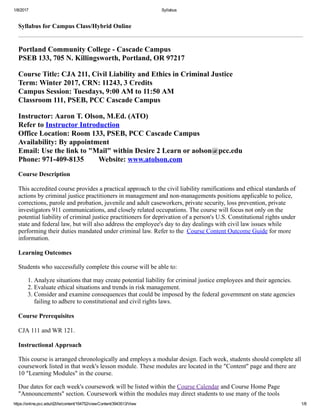
Syllabus for CJA211 - CJA-211-0-11243 - Civil Liability & Ethics in CJ
- 3. 1/8/2017 Syllabus https://online.pcc.edu/d2l/le/content/164752/viewContent/3943513/View 3/8 F < 60 Course Grade Guidelines Students should consult PCC's Academic Standards and Practices Handbook: Grading Guidelines regarding Traditional Grades and Pass/No Pass Systems. Academic Integrity (rules about cheating, plagiarism, or sharing work) Cheating is against PCC policy. Cheating includes any attempt to defraud, deceive, or mislead the instructor in arriving at an honest grade assessment, and may include copying answers from other students or using unauthorized notes during tests. Plagiarism is a particular form of cheating that involves presenting as one's own the ideas or work of another, and may include using other people's ideas without proper attribution and submitting another person's work as one's own. Violations of the cheating policy will result in a grade of '0' for the assignment in question, and may result in a failing grade for the course at the instructor's discretion. For further information review the institution's Academic Integrity Policy. Required Text The course textbook is Civil Liability In Criminal Justice, 6th or 7th Edition by Darrell L. Ross, Anderson Publishing. The textbook is available at the PCC bookstore or from any online bookstore vendor. Required Readings Chapter 1 Overview of Civil Liability Chapter 2 Foundations for Liability Chapter 3 Civil Liability Under State and Federal Tort Law Chapter 4 Civil Liability and Federal Law: Section 1983 Litigation Chapter 5 Defenses to Civil Litigation and Risk Management Chapter 6 Administrative and Supervisory Liability Chapter 7 Liability for Failure to Train Chapter 8 Operating Criminal Justice Agencies Under a Consent Decree Chapter 9 Personnel Issues and Liability Chapter 10 Use of Force in Law Enforcement and Corrections Chapter 11 Section 1983 and Correctional Liability Issues Chapter 12 Section 1983 Actions in Law Enforcement Chapter 13 Liability and Wrongful Custodial Death Chapter 14 Conclusions: Shifting Directions in Civil Litigation Tests: 40 Percent of Course Grade